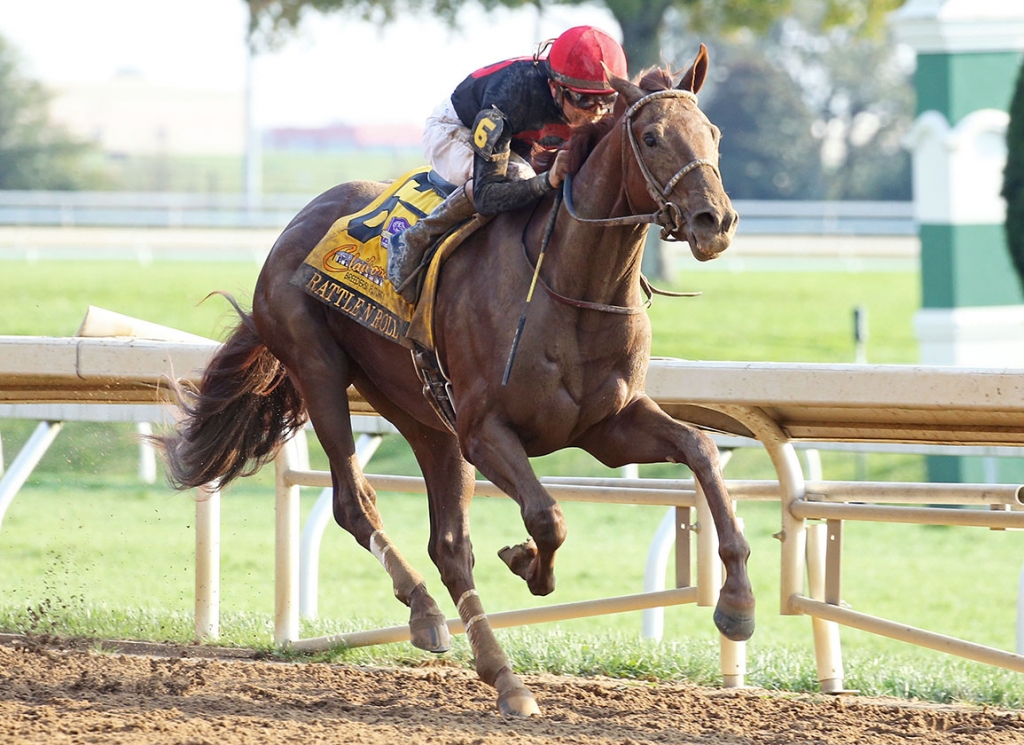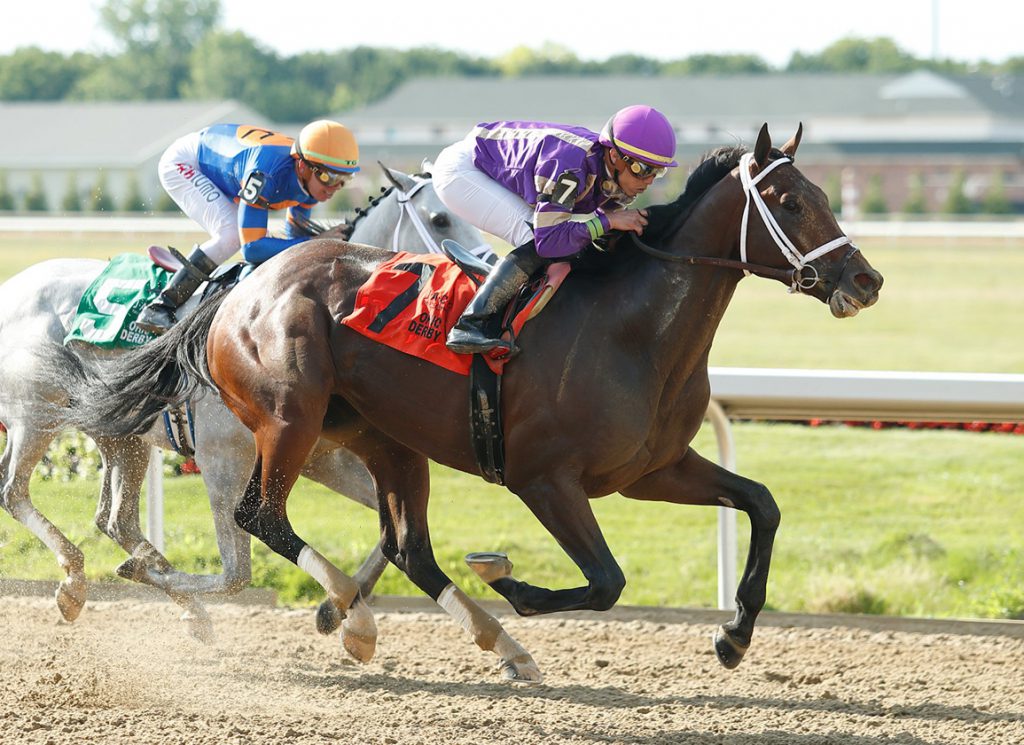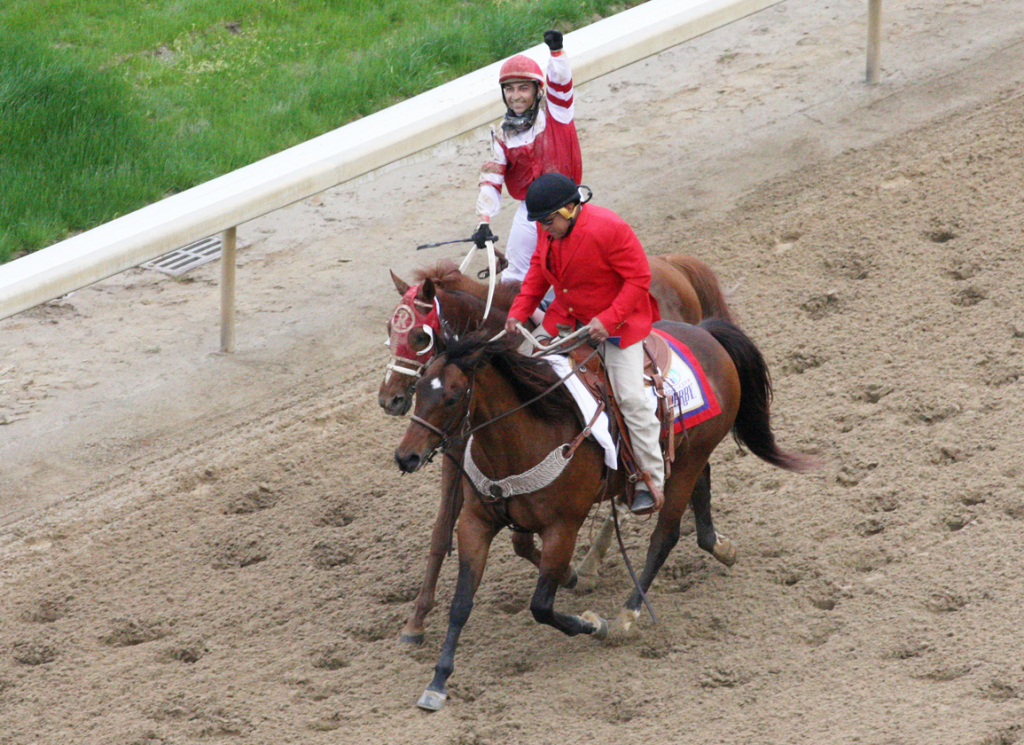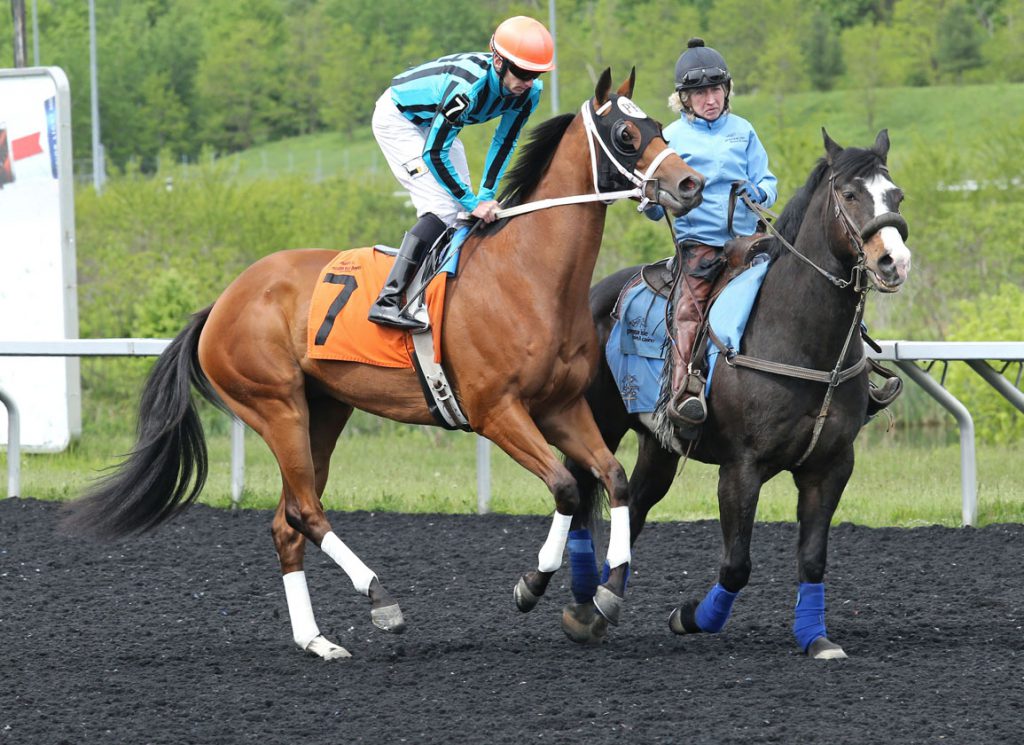He really does seem to have some kind of Midas touch right now. And a lot of people, hitting a formula that has paid off with such remarkable consistency, would be tempted to raise the stakes. But it's not just the fact that Tommy Wente is perfectly well acquainted with the other kind of luck, so routine in this business, that will stop him getting carried away. Because even if he believed that his model might be adapted to a higher level of the market, he would miss the sheer buzz of beating the odds.
“I can't go in there and buy those mares for $200,000 or $300,000,” Wente says. “They're just not going to work out for me. You'd be so heavily invested, at that point, it would be no fun. And that's what keeps me going every day, the fun of it. Trying to find young mares with blank dams, and just sitting on them for a couple of years, and seeing if their families can go to work for you. Because when they do, it's so much more of a thrill if you took a shot on something nobody wanted.”
And who knows, maybe there's something in this temperate response to his recent success that explains why his program is functioning so effectively in the first place. Maybe the kind of person who would become giddily convinced of his or her genius would never have had the clarity required to spot the same bargains.
Wente first demanded our attention last fall, thanks to the very first crop bred from a handful of mares acquired, some five years previously, after he had moved his program from Indiana to St. Simon Place in Kentucky. Four of these juveniles had contested “Win and You're In” races for the Breeders' Cup. Three won; the other ran second. Their dams had cost Wente and his partners a total $32,400.
Everyone was asking him what his secret was. He shrugged. “Am I just really, really lucky?” he asked his buddy Tommy Eastham of Legacy Bloodstock. “Or is something going on here?”
“Well, I guess anybody can be lucky once or even twice,” Eastham replied. “But man, you're just doing it over and over again. You've got to be doing something right.”

Rattle N Roll won Keeneland's Breeders' Futurity | Coady
The right thing to do, next, was to close out the cycle by cashing in a couple of those mares. Wente had bred GI Breeders' Futurity winner Rattle N Roll (Connect) from Jazz Tune (Johannesburg), found for just $20,000 at the Keeneland November Sale of 2016. Back at the same auction last fall, Hunter Valley Farm bought her for $585,000. C J's Gal (Awesome Again) had been even cheaper, picked out for $9,500 in the same ring in January 2016. Her daughter Hidden Connection (Connect) having won the GIII Pocahontas S. by nine lengths, Woodford Thoroughbreds gave $450,000 for the mare.
Time, you would have thought, to let the dust settle awhile. But Wente was only just getting started. Since then, a couple of other mares to have caught his eye have also made a name for themselves.
Just about the least surprising thing to emerge from the GI Kentucky Derby success of Rich Strike (Keen Ice) was that his dam Gold Strike (Smart Strike) had been sold to Wente deep in the 2019 Keeneland November Sale, for just $1,700. Admittedly this was a rather different case: an older mare, picked out for a friend. But then last weekend Tawny Port (Pioneerof the Nile), who had finished seventh at Churchill, confirmed himself one of the crop's most progressive colts in the GIII Ohio Derby. And it turned out that his dam Livi Makenzie (Macho Uno) had likewise been sold since his foaling, to Wente and partner Scott Stephens, for $30,000 at Keeneland November 2020.
Wente happily credits this latest coup to Carrie Brogden of Machmer Hall, a trusted mentor ever since his Bluegrass transfer.
“When I'm at a sale, I never go to the barns to look at mares,” Wente says. “I never look at a book and say, 'Okay, let's go see these 10 today.' I buy them coming into the ring, and I'm trying to get a deal on. And Carrie was sitting there, and said, 'Hey, this mare coming up, you need to take a look at her: we sold the Pioneerof the Nile yearling out of her for WinStar in September for $430,000.' We're kind of suckers for chestnuts anyway, and I liked the way she looked, and I figured that a real good Pioneerof the Nile colt could be anything. I just thought the mare might be too expensive. Because she could run, she was a stakes winner [and graded stakes-placed]. I thought she'd make $75,000 to $100,000. But I thought, 'Hell, we'll give it a shot.' And we got her.”

Tawny Port followed up a Stonestreet Lexington win at Keeneland with last weekend's Ohio Derby | JJ Zamaiko Photography
She came with a bonus, as she was carrying a filly by Always Dreaming–who has meanwhile obtained a residual value as half-sister to Tawny Port. And while “a really nice colt” by Global Campaign followed this spring, his Apr. 25 delivery left his mother only a short window and she missed on a single covering.
“But that's fine, she's in her prime [13] and the year off will do her good,” Wente remarks. “She can get back on an early cycle next time. But we do like her baby, and if Tawny Port can go on and win a Grade I, then it's all good. She's a really laid-back mare, a real sweetheart.”
As for the dam of Rich Strike, she was being culled so cheaply that Wente reckoned her ideal for Indiana horseman Merrill Roberts.
“When I'm buying these mares, a lot of the time I'm thinking in the back of my head about people who have asked me to look out for one,” Wente says. “That particular mare I bought strictly for my buddy Merrill, because they'd just got a stallion [Candy Ride (Arg)'s son Looking Cool] going and I thought she's be perfect for him, with her race record and pedigree, if they could get her in foal.”
Unfortunately that final part of the equation proved difficult, and Roberts turned her over to Austin Nicks the very week that her son came out of nowhere to land the Derby. (Nicks, unsurprisingly, wasted no time in sending the mare to Munnings!)
As already indicated, however, Wente has a properly seasoned perspective on all this success. In fact, he has an unhappy bond with Eric Reed, trainer of Rich Strike, whose career was likewise nearly unraveled by a barn fire.
Wente had become captivated by horses when visiting the barn of his stepfather, former Hoosier Park trainer Tom Hickman. Before long, even though money was tight, Wente found himself buying one of the babies.
“I way overpaid, though!” Wente recalls. “He charged me $5,000 and, looking back, the horse probably wasn't worth $200. It was for me, though, at the time. I wanted it so bad. I was driving a truck in those days, and giving him like $500 a month for this horse. And I'd just got it all paid off, and the horse had just had his first run. They were stabled down there at the old Quarter Horse track in Henderson, Kentucky, and one night I got a call, 2 a.m., to say he'd lost all these horses burned up in a fire.
“He had always told me, 'You know, if you're not willing to put $1,000 in an ashtray and burn it, don't get into this business.' To this day I always try to remember that. Only in my case it wasn't bills in an ashtray. It was that poor horse in a burning barn. But I was hooked, even so. Next day I was back on it, looking for a new one.”

Wente picked out the Derby winner's dam at Keeneland November in 2019 for a friend | Coady
Looking back, in fact, Wente wonders whether the early difficulties he has had to overcome–both in his own life, and then in his journey of Thoroughbreds–have condensed into a foundation stone essential to his better fortunes now.
“We were raised poor,” he stresses. “And I had my struggles, trying to find my way. I couldn't save money. I owed everybody. I robbed Peter to pay Paul. But I straightened up. I figured I wanted more from life. And I think it was the horses that did that for me.
“I don't know if you need that; whether you need to know the bottom to appreciate everything more. But now, when I look back to when I was new to the game, and thinking of those really poor horses as the best thing in the whole world, and my stepdad teaching me all those things, him being so back in the old ways, I think that really helped me towards where I am today. Having all that under my feet gave me a different perspective.”
Wente is candidly disparaging about the animals he raised in Indiana, but they sharpened his judgement and taught him to respect every horse as a potential opportunity. Coming to Kentucky just elevated the caliber of the disrespected, the rejects.
Conceivably, moreover, perhaps the resilience Wente had himself acquired can be shared with the young stock on St. Simon Place?
“It's so true,” Wente replies. “If you baby them, pamper them, to me they're not going to make racehorses. They need to get out there, need to knock heads, knock bodies. They need to get cuts, to get sore. They need to be in the snow, in the rain, in the heat. They need a struggle. Because when I struggled, I got tough. And I think it's the same with horses.”

MSW One Timer, another bred by Wente and St. Simon Place | Coady
Maybe, then, that's at least part of the answer. Not that many of those asking Wente for his “secret” will find that very helpful. It was only as an outsider, making a journey few would choose by design, that Wente found redemption in horses. Maybe that couldn't have happened if, like so many competitors, he had been born to this way of life, and not in suburban poverty near St. Louis.
“Everybody's just shaking their head and they're like, 'How in the world are you doing this!?'” says Wente with a chuckle. “And like I said, I don't know whether I'm just really, really lucky, or I'm doing something right. But I think the people that have the wealth to back themselves up would still rather buy mares with more page, mares with some produce under them, mares that are already proven out. But they've got the money. Me, I do the opposite. Because I have to buy cheaper mares, I'd rather buy one that has no page but might get some runners. Because things can change so fast. I bought Spanish Star (Blame) for $1,500 off the track [Keeneland November 2017], and then, bam, her brother [Sir Winston (Awesome Again)] wins the Belmont. And now she's had One Timer (Trappe Shot).”
That colt is currently four-for-five, his sole defeat at the Breeders' Cup. But while a lot of things have been falling into place, Wente emphasizes that he has not done it all on his own. On the farm Calvin and Shane Crain run a parallel sod-growing business, and he has partners in a broodmare band now extending to 40 or so, as well. And whatever inspiration Wente may bring to the equation himself, he will only take credit for perspiration.
“You've got to be dedicated,” he says. “You have to live and sleep this business. I'm hands on. I like to get out there and mow my own grass. I don't know if that helps me do what I'm doing, but I do know that I love it. And since I came over here, and Carrie took me under her wing, everything's been going great. I just feel blessed.”

The post Tawny Port Another Strike for Wente appeared first on TDN | Thoroughbred Daily News | Horse Racing News, Results and Video | Thoroughbred Breeding and Auctions.
Source of original post




